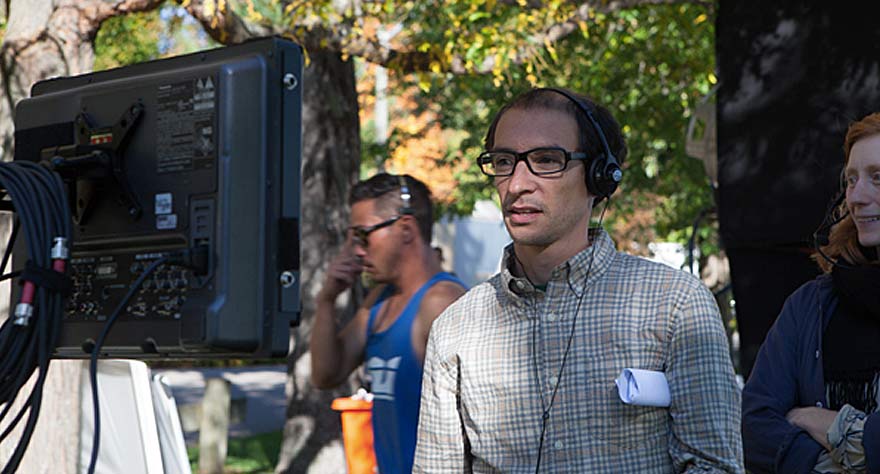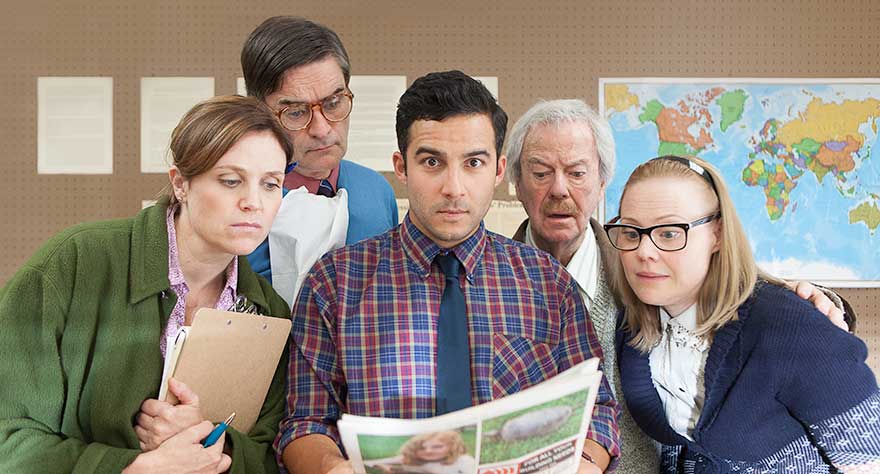Daniel Perlmutter Tells Us About The Thrill Of Making ‘Big News From Grand Rock’

In Big News From Grand Rock, Leonard (Ennis Esmer) is the editor of The Weekly Ledger, the small town’s newspaper. When the Ledger’s owner (Gordon Pinsent) announces his intentions to sell the paper, Leonard comes up with a way to improve sales: adapting old movies into news articles. At first, Leonard’s plan succeeds, with no one questioning the validity of his news stories. When one of Leonard’s made-up articles end up creating a fervor across town, it attracts the attention of a bigger newspaper looking for a good story.
After a lengthy development process, and an Indiegogo campaign to help get extra funding, Big News From Grand Rock finally hits theatres this weekend in Canada. Before the film’s Canadian release, we talked with writer/director Daniel Perlmutter about his debut feature. Read on for the full interview below, and look out for Big News From Grand Rock which opens this week in limited release across Canada.
What drew you to wanting to make a film about a small town?
I’ve never lived in a small town, but I do love spending time in them. The slower pace and simpler life is always appealing, and especially so as a setting for a story because it eliminates a lot of the variables you would otherwise need to worry about. You can get a real sense of who the police are, who’s active in the community, and what’s important to the town. It’s just easier to get a handle on, and it allows for something of a microcosm.
You shot this in Midland, Ontario. Did it take a while before you found your “Grand Rock,” and in the end what made you decide on Midland?
The “casting” of the town was a real process. We were looking initially at towns closer to Toronto, Ontario for ease of transportation, and we considered shooting some of the scenes, like the newspaper office, in studio. But nothing felt quite right, and it was so important to get the right town because it plays such an important role in the film. I knew Midland because my wife has family there, but had not really been thinking of filming there until we were midway through the process and were unable to find anywhere else. I suddenly realized Midland had everything we needed: it was the right size, it was picturesque without being overly touristy, and it had real charm and character. I also knew that I wanted to get some local talent into the film and Midland, though it’s only an hour and a half north of Toronto, has something of its own dialect and sound. Being able to cast locals, some of them having never acted before, helped bring some character and an authentic feel to the film. We were the first feature to shoot in Midland, but we had such a great experience I don’t think it will be the last.
This isn’t your first time behind the camera, but it is your first feature-length film as a director. How would you sum up your experience directing Big News from Grand Rock?
It was a thrill. It took a long time to get the movie made. It was in development for over five years, but once we were shooting it just felt like everything fell into place. We still had problems with locations and weather that all productions run into, but we had such a great cast and crew. I felt a lot of good will from everyone, like they all were there to make this silly movie as good as it could be, so for me it was just a joy to get up every morning and start a new day of shooting. It was a quick shoot in the end, 18 days, but I real feel like we made the most of it.

You said that your inspiration for this film came when you were watching Shattered Glass. Do you tend to get inspired by seeing the comedy in more serious, dramatic things?
This started as just a simple, silly idea that felt like it had some traction. I think a lot of times what I find interesting or funny is the reality of situations that would otherwise seem dramatic, the details you have to worry about, the little things that you don’t think of. If you take a premise, [whether it’s] dramatic or sci-fi or horror or whatever, and start thinking about what all the little banal details of that premise are, well that always seems funny to me.
Something that sets your film apart from other recent comedies is that it feels completely earnest.
With this project really a lot of the humour came from the characters – it was important to me, right from the start, that the film have a warm tone – that it wasn’t making fun of this place or these characters. And the more the script was developed, the more it became an almost low-key kind of comedy. Even though the premise is so silly, we’re not going for big set piece laughs, just little character moments. And that really all comes from the cast and what they bring to their characters. Most of the new comedies I really love are R-rated, and this felt like such a gentle family comedy. I didn’t know if there was a place for that anymore. But we decided to just embrace it and go full on in that direction. There was something kind of nice about making this movie with only one swear word in it. A real departure from the last film that I co-wrote, Peepers, which was about Peeping Toms.
What was the casting process like, especially with choosing Ennis Esmer to play Leonard?
Ennis was actually the host of a TIFF pitch competition where the film got it’s start. I pitched the film and won, and Ennis came up to me afterwards to say he loved the idea and wanted to be involved. I always thought he’d be great in a supporting role, but the more we got into casting the more it became clear he could carry this movie. And he really carries the movie. He’s in almost every scene, and on set he kind of set the tone as far as the energy he was looking for. And he’s such a great improvisor.
Leonard is a nice, likeable guy, but he still tricks people by writing fake stories. Was it hard to write Leonard in a way that would still make him likeable despite doing something so wrong?
In the early drafts of the script Leonard was very unlikable, but it was almost a darker movie. In those early drafts he was also making up stories to save his own job, which made it a much more selfish ploy. When we developed the project more and took it in this sweeter, more grounded direction, I found that it was important to make it clear that Leonard was doing the wrong thing for the right reason. He loves the town and the paper, and he just makes a bad decision about how to save it. Then he has to live with that decision and that just complicates matters. Once we made that shift of motivation, that he was doing it for the paper and not himself, his character fell in line, and he became much more likable and sweet.
Your film was partially funded through an Indiegogo campaign. How do you feel about crowdfunding as a source for making indie films? Would you do it again?
I think it’s great for all sorts of projects and we probably wouldn’t have been able to make the film without it, but I do wonder about the sustainability of crowd funding campaigns. It makes most sense to me for projects that an audience already has an emotional connection with – a book or a web series or some other source material that people would love to see on the big screen. As for myself, I feel like this was my one shot at it. You need that base of support from friends and family to make one of these campaigns work at that level, and I don’t know if I could go back to the well again.
Your film started its development process back in 2009. How does it feel to have it finally come out almost 6 years later, and are you already working on something else?
It’s been great that finally people have a chance to see the film I’ve been working on for so long. Especially gratifying has been the experience with TIFF’s Film Circuit, which takes the film around the country to smaller communities. I’ve gone to a bunch of those screenings, and seeing people in small towns relate to the film has been fantastic. Also, making a comedy, it’s always good when you can finally hear an audience laughing. But I am eager to get my next film going. I’m just finishing a script now which I hope to shoot next winter with my sister’s production company, First Love Films. It’s a kind of horror/comedy project that I’m very excited about.
